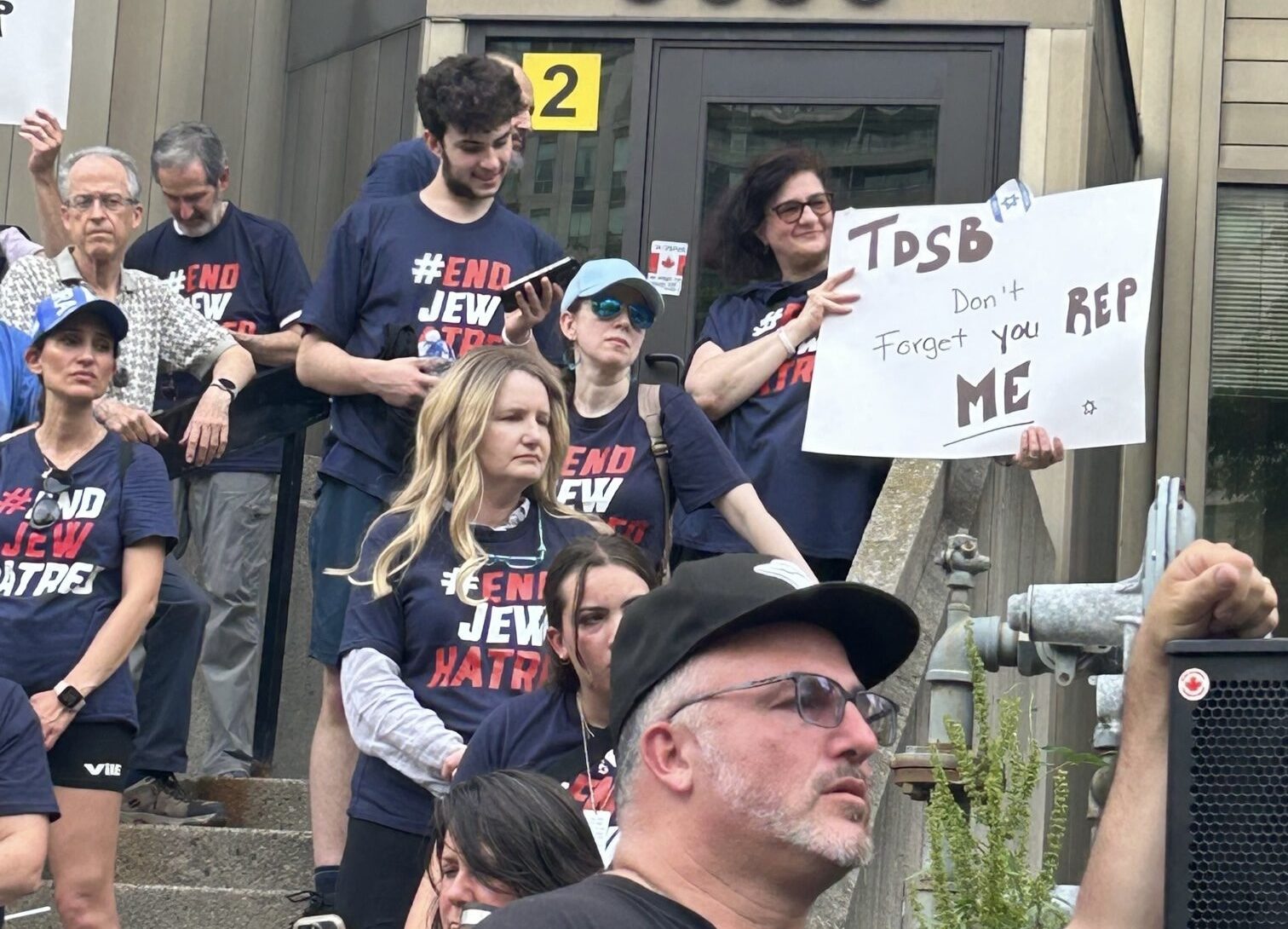UPDATE (6/20/24): The report was adopted by TDSB trustees with a request to incorporate data about antisemitism. A motion to include anti-Israeli racism was defeated as a result of an 11-11 vote.
Hundreds of people filled the lawn in front of the Toronto District School Board (TSDB) to oppose a proposed anti-discrimination policy set to be voted on by trustees that would include recognizing anti-Palestinian racism—while failing to acknowledge rising antisemitism in schools.
The report, entitled Combating Hate and Racism: Student Learning Strategy, was received without any amendments by a TDSB committee with a vote of 5-3 and was sent to the full board for approval on June 19. Cries of ‘Shame’ and ‘Racists’ filled the board room after the report was received.
The board’s director of education Colleen Russell-Rawlins had recommended the report be referred back to staff for “re-envisioning” because it did not recognize antisemitism in schools.
The motion to return the report to staff was defeated in a 4-4 vote.
The report lists seven areas of discrimination including ableism, anti-Black racism, antisemitism, Islamophobia, anti-Asian racism, homophobia and transphobia.
Anti-Palestinian racism (APR) was added “in response to student and community voices,” the report states.
TDSB chair, trustee Rachel Chernos Lin, said she supported sending the report back to staff because it did not adequately explain what was meant by anti-Palestinian racism.
“The addition of anti-Palestinian racism without explanation of what that was and what staff were thinking has caused a lot of fear, concern, questions,” Chernos Lin said at the board meeting.
“What was absent from this report is what happens when a student goes into a bathroom and discovers graffiti, a swastika, how do we handle itt?… What happens if a Palestinian kid identifies as a Palestinian and another kid calls them a terrorist?
“I was one of the only Jewish kids in my (TDSB) high school and I hid my identity. I don’t want any child to feel they have to hide their identity,” she said.
Including anti-Palestinian racism without similar protections against anti-Israeli racism, will leave Jewish students and staff vulnerable, trustee Alexandra Lulka Rotman pointed out.
“This APR definition goes well beyond ensuring equity and protecting against discrimination and harassment and could be used to silence all voices of opposition to a particular narrative and who decides what is the correct narrative?” she said
TDSB’s own data shows that antisemitism has “skyrocketed” but there was no mention of it in the report, Lulka Rotman told the board.
“Staff looked at our data that shows antisemitism has risen by 300 percent over the last two years and said ‘let’s ignore that and now is the time to include APR unilaterally with no mention of anti-Israeli racism.’ Why are we singling out a single nation for anti-racism policy when our city and school system serves students and families from many different nations?
“By including APR in this report with no definition and no meaningful data, the board has opened the door for the conversation to be defined by a vocal fringe of anti-Israel activists pushing a problematic definition that has already been used to target myself and can easily be used to target other Jews and Israelis in the TDSB,” she said.
Tamara Gottlieb, a founding member of Jewish Educators and Family Association of Canada (JEFA) which helped organize the rally before the board meeting, told The CJN that the board’s decision to accept the report was “very disappointing.”
“We already know that all of the TDSB’s strategies for combatting hate and racism don’t work. We heard last night from (trustee) Weidong Pei that anti-Asian racism is up over 100 percent, anti-Jewish hatred is up 300 percent… What will happen with the adoption of another highly geopolitical policy? Likely an increase of the same.
“The board has condoned anti-Zionism and they do not see it as a form of racism,” she said.
The Centre for Israel and Jewish Affairs (CIJA) also called on the board to reject the anti-racism strategy at their June 19 meeting.
“We are very disappointed that the trustees chose to disregard the Director of Education’s expressed concern regarding the report’s missing focus on antisemitism and her recommendation that the report be sent back to staff for further consultation,” stated Jess Burke, CIJA’s director of diversity, equity, inclusion and training.
“Furthermore, the adoption of ‘anti-Palestinian racism’ in the (policy) will result in the censorship of core aspects of Jewish identity. Endeavouring to redefine what does and does not constitute antisemitism, APR is inherently oppressive… No one other than the Jewish community gets to define what is or is not antisemitism. This should have been avoided at all costs.”
At a rally held outside the board’s office before the vote, several parents and students spoke publicly about the antisemitism and anti-Israel incidents they had encountered in the classroom. Over 100 people had registered to address the meeting, however delegations were not scheduled because the meeting was considered an extension of an earlier meeting held on June 5 when public presentations were allowed, a board spokesman said.
“The motion presented today only serves to divide students and further victimize all minorities,” Cole Fisher, president of the Jewish Student Union at Earl Haig Secondary School, told the rally.

“At my school alone, dozens of antisemitic incidents have occurred, involving teachers and students. On Oct. 10, students ran around the school wearing keffiyehs and calling for ‘death to the Jews’ and ‘intifada’,” Fisher said.
Jewish students have been threatened with violence and told that ‘Hitler was right’ he said. A guest educator wearing a T-shirt with the Palestinian flag superimposed on a map of Israel was invited to the school, Fisher said.
Melissa Tapper described how a video produced by the news organization Al-Jazeera was presented alongside a Holocaust education discussion in a Grade 7 classroom.
“This video was designed to elicit emotional responses rather than present history,” she said. “This lesson served to forward a teacher’s ideology and political views rather than educating, skill-building or creating an inclusive space for all.”
Posters around the classroom read ‘Stop Apartheid’ and directed students to a website called “Palestinian Genocide Victims,” she said.
The teacher has held a ‘Nakba lunch and learn’ despite opposition from the principal, Tapper said.
“Allowing unapproved teaching materials with a geopolitical agenda with absolutely no consequences undermines trust in the TDSB,” she said.
Speaking before the board meeting, JEFA co-founder Aaron Kucharczuk told The CJN, that he hoped the school board not only returned the report to staff but would also adopt concrete measures to address antisemitism including mandatory antisemitism training for staff and implementing a safe reporting process for students and staff who don’t feel comfortable coming forward.
“We are asking people to come out and advocate for change at the TDSB because they don’t take antisemitism seriously,” he said.
CORRECTION: While the original headline on this story indicated the report doesn’t mention antisemitism at all, that is incorrect as the report references it six times, without alluding to the recent rise.







